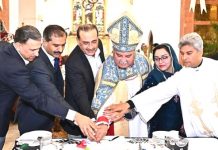ISLAMABAD Nov 16 (TNS): Tareen is facing a disqualification petition filed by PML-N leader Hanif Abbasi over alleged non-declaration of assets in the 2013 general elections’ nomination papers, and for not mentioning his offshore companies
BBC has carefully deconstructed the Trust Deed comprising 37 pages submitted by Jahangir Tareen in the Supreme Court (SC). According to the Schedule 3 of the ‘Trust Deed’, which was signed on May 5, 2011, between settlor Jahangir Tareen and trustee HSBC Trust Company, only Tareen and his wife were the ‘discretionary beneficiaries’ of this trust when this ‘Trust Deed’ was signed.

According to the documents, Tareen is a settler for a trust which in turn runs an offshore company, Shiny View Limited, and owns 12 acres of property in the UK. According to the original trust deed, HSBC Bank (Pvt) Ltd is the trustee. The trust was created for 150 years in May 2011.
The PML-N legal team is claiming that Tareen will be disqualified as he had not disclosed the property in UK while filing nomination papers before the Election Commission of Pakistan.

A member of the PTI’s legal team, however, believes that there is a stark difference between being a ‘discretionary beneficiary’ and a ‘beneficial owner’, adding that Tareen is no longer the legal owner of the trust as it is owned by the bank. Tareen has already provided a copy of a UK court judgment, establishing the legality of the trust and his claim that he is not a beneficial owner, says the legal team members.
According to him, unlike Tareen, Maryam Nawaz was actually a beneficial owner of a flat in London.

Legal experts believe that the SC’s interpretation on ‘discretionary lifetime beneficiary’ will be significant in this case.
Pakistan Muslim League-Nawaz (PML-N) lawmaker Hanif Abbasi, in 2016, filed a petition against Pakistan Tehreek-e-Insaf (PTI) General Secretary Jahangir Tareen for getting him disqualified. According to Abbasi’s stance, Tareen had allegedly, in the 2013 general elections’ nomination papers, not mentioned his offshore companies; therefore, Abbasi urged that Tareen should be disqualified.

In response to this petition, Tareen, in a statement submitted before the Supreme Court in Nov 2016, said that his independent children were the beneficiaries of the offshore company as per the conditions laid out in a trust. He further submitted that he had no beneficial interest or favour in this company, and that he was just a ‘settlor’ of this trust and was not legally bound to show the record of this company on his election nomination papers.
BBC has carefully deconstructed the ‘Trust Deed’ submitted by Jahangir Tareen in the Supreme Court (SC). According to the Schedule 3 of the ‘Trust Deed’, which was signed on May 5, 2011, between settlor Jahangir Tareen and trustee HSBC Trust Company, only Tareen and his wife were the ‘discretionary beneficiaries’ of this trust when this ‘Trust Deed’ was signed.

It is worth-mentioning here that according to the ‘Trust Deed’, the settlor, Jahangir Tareen, had the right to add or remove anyone from being a lifetime beneficiary of this trust. And for doing so, Tareen would have to inform the trustee, the HSBC Trust Company, in writing.
If Tareen had added his children as the lifetime beneficiaries of this company later on, then the trustee must be having a written record of this addition. The attempts to get a statement from Tareen’s lawyer, Sikandar Bashir Mohmand, failed. However, some questions were sent to him through WhatsApp. Jahangir Tareen is shown as a lifetime beneficiary in the ‘Trust Deed’. Does this ‘Trust Deed’ nullify Tareen’s statement submitted in the SC? According to the record, he said that his independent children — not him — were the beneficiaries of this company as per the conditions laid out in a trust.

He was further asked if Tareen has signed the ‘Trust Deed’ to make his children the lifetime beneficiaries. According to the ‘Trust Deed’, for taking this step, it was important to inform the trustee in writing. Does Tareen have any proof of taking this step? When was it done? Does he have written evidence?
Mohmand was also asked if he and his wife were still the discretionary beneficiaries. Is Jahangir Tareen still the lifetime beneficiary? If not, then when did he detach himself from this trust as a beneficiary?
Until now, the lawyer of Jahangir Tareen has not responded to these questions. In the same regard, when PTI leader Fawad Chaudhry was asked about this issue, he insisted that Jahangir Tareen’s children were the only beneficiaries of this trust. He was asked that according to which clause of the ‘Trust Deed’, Jahangir Tareen’s children were made the beneficiaries. He referred to the Schedule 4 of the ‘Trust Deed’ to answer this question.

In the Schedule 4 of ‘Trust Deed’, there is a clear mention of Tareen’s wife and children as beneficiaries, but this schedule can only come into effect after the death of Jahangir Tareen.
According to the Clause 7 of the ‘Trust Deed’, in the case of Tareen’s death, his children and grandchildren can become the beneficiaries of this trust. However, it was difficult to understand how this schedule was applied when Tareen was still alive.
According to law experts, the Clause 6.3 of the ‘Trust Deed’ indicated that the trustee can pay the complete amount of the trust fund or partial amount of the fund to the discretionary beneficiary in Tareen’s lifetime.

When the ‘Trust Deed’ was signed, only Tareen and his wife were the discretionary beneficiaries according to Schedule 3. Apart from this, according to Clause 7 of the ‘Trust Deed’, the trustee will manage the trust company’s income and capital according to Schedule 4 of the ‘Trust Deed’ in case of Tareen’s death.
In the ‘Trust After the Settlor Lifetime’ section, it is highlighted how the company would work. As per this title of Schedule 4, in case of Tareen’s death, his wife and children will be the discretionary beneficiaries of the trust.

According to Item 2 of Schedule 4, Tareen’s wife, in case of Tareen’s death, can ask the trustee to provide her the income of the trust or someone else nominated by her. As per Item 3 of Schedule 4, Tareen’s wife can also direct the trustee to give the income of the trust to beneficiaries.
According to the different clauses of the ‘Trust Deed’, it becomes clear that in his [Jahangir Tareen’s] lifetime, the only discretionary beneficiaries of his company are he and his wife. And his children cannot be the discretionary beneficiaries as long as he is alive.














